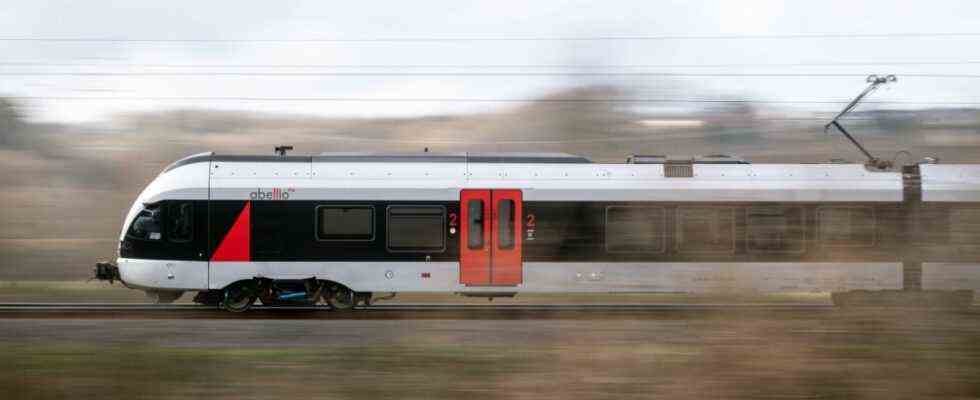The letter sounds impressive: “Ensure the continued existence of Abellio in Germany”, wrote Jürgen Lapp, the chairman of the works council of the railway operator, recently in an open letter to various transport politicians. “Save 3,100 jobs!” Was his appeal. In fact, the railway operator, a subsidiary of the Dutch state railway, got into a dramatic imbalance in June. The company is in a protective shield process, a restructuring process within the framework of insolvency law.
In contrast to long-distance transport, where Deutsche Bahn (DB) dominates the action with its brightly painted ICE and IC trains, local rail passenger transport is more colorful: In addition to the mostly red local DB local trains, many other competitor trains run under other green painted trains from Agilis or mostly white and blue railcars from Transdev. You have to know that the federal states have the say in local rail passenger transport. You act as a so-called customer: you determine how often, for example, regional trains run between Kufstein, Rosenheim and Munich or between the Thuringian capital Erfurt and Sangerhausen in Saxony-Anhalt. They then put this company out to tender for several years, conclude a contract (usually running for several years) with an operator – and pay a predetermined price for the journeys specified in the respective contract.
More competition, more trains
In this way, many competitive railways have been able to steal market share from DB in recent years: The Munich-Rosenheim-Kufstein route, for example, is used by the French transport group Transdev, which is operated by Abellio between Erfurt and Sangerhausen. In North Rhine-Westphalia, on the other hand, in addition to Keolis, a subsidiary of the French state railway SNCF, the Nordwestbahn (also part of Transdev) and some smaller providers, Abellio is also active. According to a report by the North Rhine-Westphalian local transport association, the market share of competitors in North Rhine-Westphalia is around 53 percent.
But Abellio in particular is now in danger of derailing – which could not only bring trouble to passengers in North Rhine-Westphalia. The company also operates routes in Baden-Württemberg, Saxony, Thuringia and Saxony-Anhalt. A trustee is currently sounding out the prospects. The employment agency still pays the wages until the end of September, after which Abellio has to do this himself. In the worst case, Abellio could withdraw completely from the German market. Of the Rheinische Post the court-appointed trustee Rainer Eckert recently said: “Operations from October 1st can only be secured if there is an agreement on how it can be designed economically.”
But that’s tricky. Negotiations have been going on for a little over a year and a half. Back payments and better contractual rules are necessary so that DB’s competitors also have a long-term perspective, says Matthias Stoffregen from the Mofair association, which represents the railroad’s competitors. The question is whether there will continue to be competition on the railways in the future or whether regional transport will again be taken over by DB alone due to the lack of competition in many places. “That would be a setback for the passengers because it would make the offer worse,” says Stoffregen.
In fact, in recent years the federal states have managed to heat up competition among rail providers – and thus allow significantly more trains to run. Employee representatives and many DB executives, however, repeatedly criticized the fact that the competitors had managed to gradually push the red DB trains off the track, mainly through dumping prices. So now this pricing policy would take revenge.
Construction sites slow down the trains
Association managing director Stoffregen claims: “Our member companies are in the red through no fault of their own.” Much more is being built in the rail network than in the past – something that not only rail operators but also passenger representatives generally welcome. After all, the German rail network has been run for wear and tear in many places over the past few years and decades. But because of the many construction sites, the railway operators would now have to pay fines for delays or finance rail replacement services with buses, says the Mofair managing director.
The need for personnel has also increased significantly. Because there is a lack of train drivers nationwide, the railway operators recently agreed to new collective agreements – among other things, according to Stoffregen, the weekly working time fell from 40 to 38 hours, and rest periods were also extended. The operators would now have to employ correspondingly more staff. The bottom line is that all of this costs the companies dearly, according to Stoffregen. And the additional costs were not foreseeable when the ten to 15 year contracts were signed.
It remains to be seen how it will continue. Since the beginning of 2020, i.e. for a good one and a half years, talks have been going on in NRW between the state’s operators and buyers. Should Abellio give up, other providers would have to be found in a hurry to step in. But such an emergency award could drag on – in the end, the passengers could be the stupid ones if the trains stop running. According to industry circles, the state could force Abellio to continue operations for the time being with a so-called imposition. But then the state would have to pay for it.

